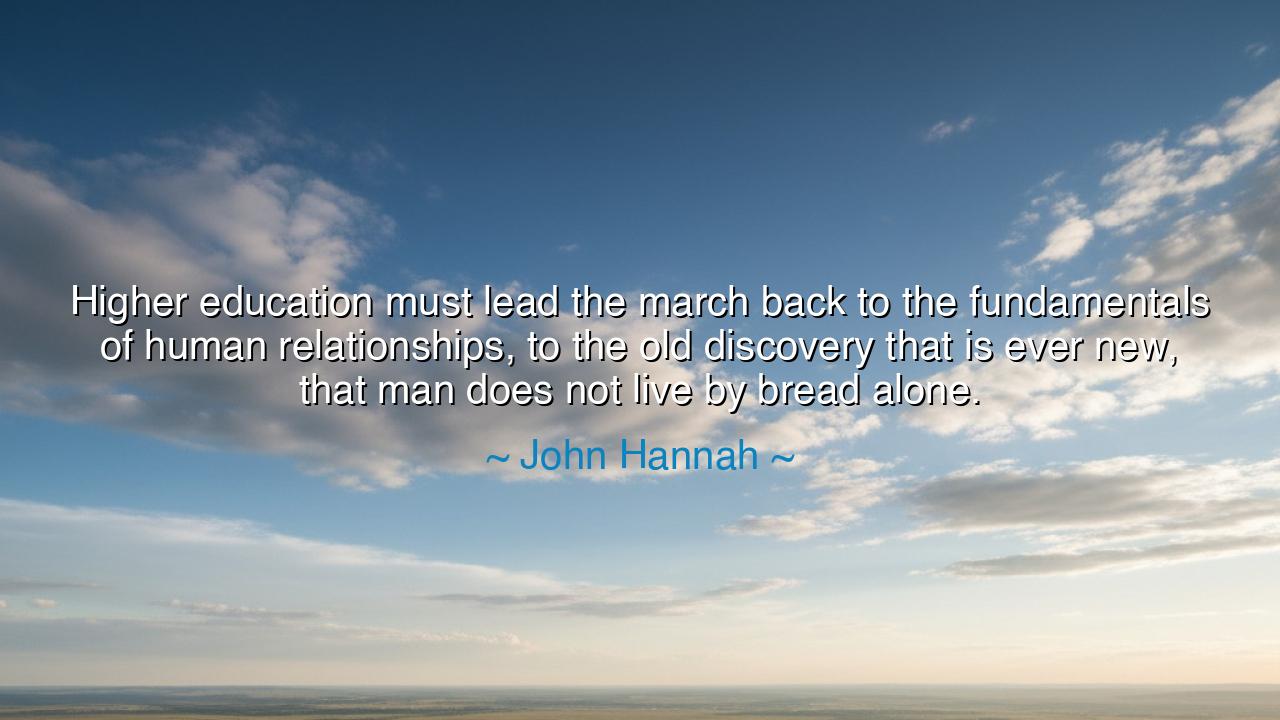
Higher education must lead the march back to the fundamentals of
Higher education must lead the march back to the fundamentals of human relationships, to the old discovery that is ever new, that man does not live by bread alone.






The words of John Hannah — “Higher education must lead the march back to the fundamentals of human relationships, to the old discovery that is ever new, that man does not live by bread alone.” — ring like a call to awakening across the halls of learning and the ages of civilization. They are a summons to remember that the purpose of knowledge is not merely to feed the body, but to enlighten the soul; not merely to advance society’s machinery, but to preserve its humanity. In this statement, Hannah — an educator and statesman of the mid-twentieth century — spoke as both a scholar and a moralist, warning that education stripped of compassion, and intellect divorced from conscience, lead not to progress but to peril.
To grasp the depth of this wisdom, we must first understand the echo it carries. The phrase “man does not live by bread alone” comes from the ancient words of Scripture — from the Book of Deuteronomy and later from the lips of Christ in the desert. It means that man’s survival is not sustained merely by material needs, but by spiritual and moral nourishment — by meaning, truth, and love. When Hannah wove these sacred words into his vision of higher education, he reminded the modern world that knowledge without heart is hollow, and progress without ethics is dangerous. For even as man builds cities that touch the sky, he must not forget the invisible foundations of kindness, justice, and faith that hold civilization together.
Hannah’s warning was not born of abstraction, but of experience. He lived in the shadow of two world wars and saw how intellect — uncoupled from moral restraint — could destroy rather than uplift. The same science that cured disease also created weapons of unimaginable devastation. The same education that enlightened minds also taught men to manipulate truth for power. In such times, Hannah saw the role of the university not as a factory of facts, but as a guardian of the human spirit. He called upon education to “lead the march back” — to become again what it once was in the days of Socrates, Plato, and the great teachers of every age: a means not only to know the world, but to know oneself, and to serve one’s fellow man.
Consider the example of Mahatma Gandhi, who though not a university scholar, embodied the very truth Hannah spoke of. Gandhi mastered the law in London, but it was his understanding of the human heart — his grasp of compassion, humility, and justice — that changed the world. He fed not only the hungry stomachs of the oppressed, but also their hungry souls, reminding them of their worth and dignity. His life is a living testament that knowledge without virtue is lifeless, but knowledge guided by love becomes a force divine. Gandhi’s education was not measured in degrees, but in his ability to awaken the conscience of mankind.
When Hannah spoke of returning to “the fundamentals of human relationships,” he did not mean to abandon science or progress. He meant to reunite wisdom and humanity, intellect and empathy, reason and reverence. For what good is a mind that can split the atom, but cannot heal division? What good is progress if it feeds the body but starves the soul? To teach compassion is as important as to teach chemistry; to nurture humility is as vital as to nurture innovation. Only when education balances the material with the moral can it fulfill its true destiny — to create not only workers and thinkers, but whole human beings.
There is, in Hannah’s words, both a rebuke and a hope. He rebukes the age that measures success in wealth and titles, forgetting that true greatness lies in character and service. But he also gives hope — that by returning to first principles, by remembering that humanity is the highest form of learning, education can still redeem the world. For every generation forgets, and must learn anew, that man is not a creature of appetite alone, but of spirit; not sustained by what he consumes, but by what he creates, believes, and gives.
The lesson, therefore, is clear and timeless: seek knowledge not only for the mind, but for the heart. Let your education — whether in the classroom, in labor, or in life — draw you closer to others, not farther apart. Feed your curiosity, but also your compassion. Remember that the world’s problems are not solved by intellect alone, but by wisdom joined with empathy. In every field — science, art, business, or law — let your learning serve life itself.
So, O student of the ages, hear the voice of John Hannah across time: “Man does not live by bread alone.” Study deeply, but love more deeply. Pursue greatness, but never forget goodness. For when knowledge walks hand in hand with virtue, when the mind and the heart march together, then — and only then — will humanity truly progress, not merely in power, but in peace.






AAdministratorAdministrator
Welcome, honored guests. Please leave a comment, we will respond soon